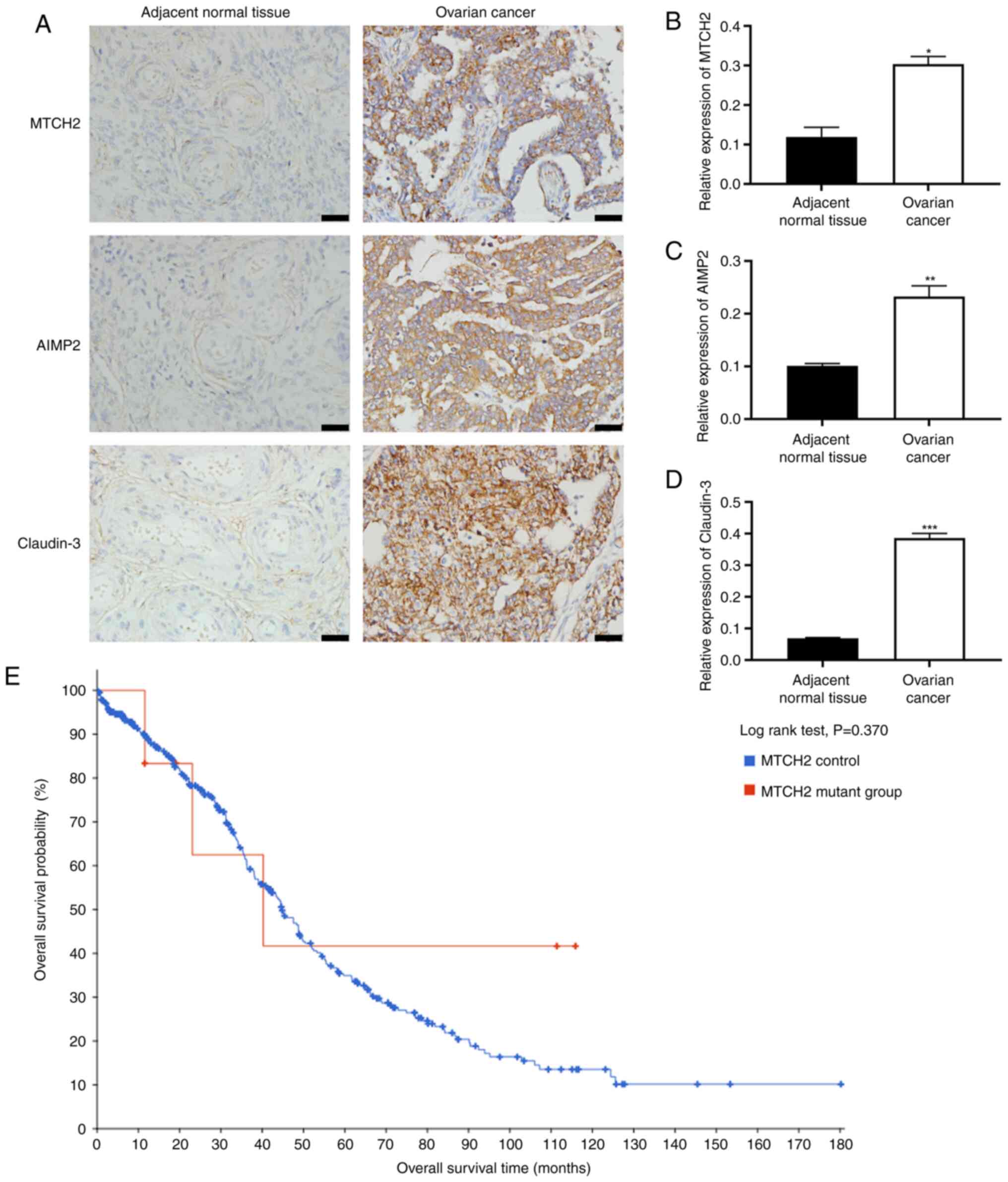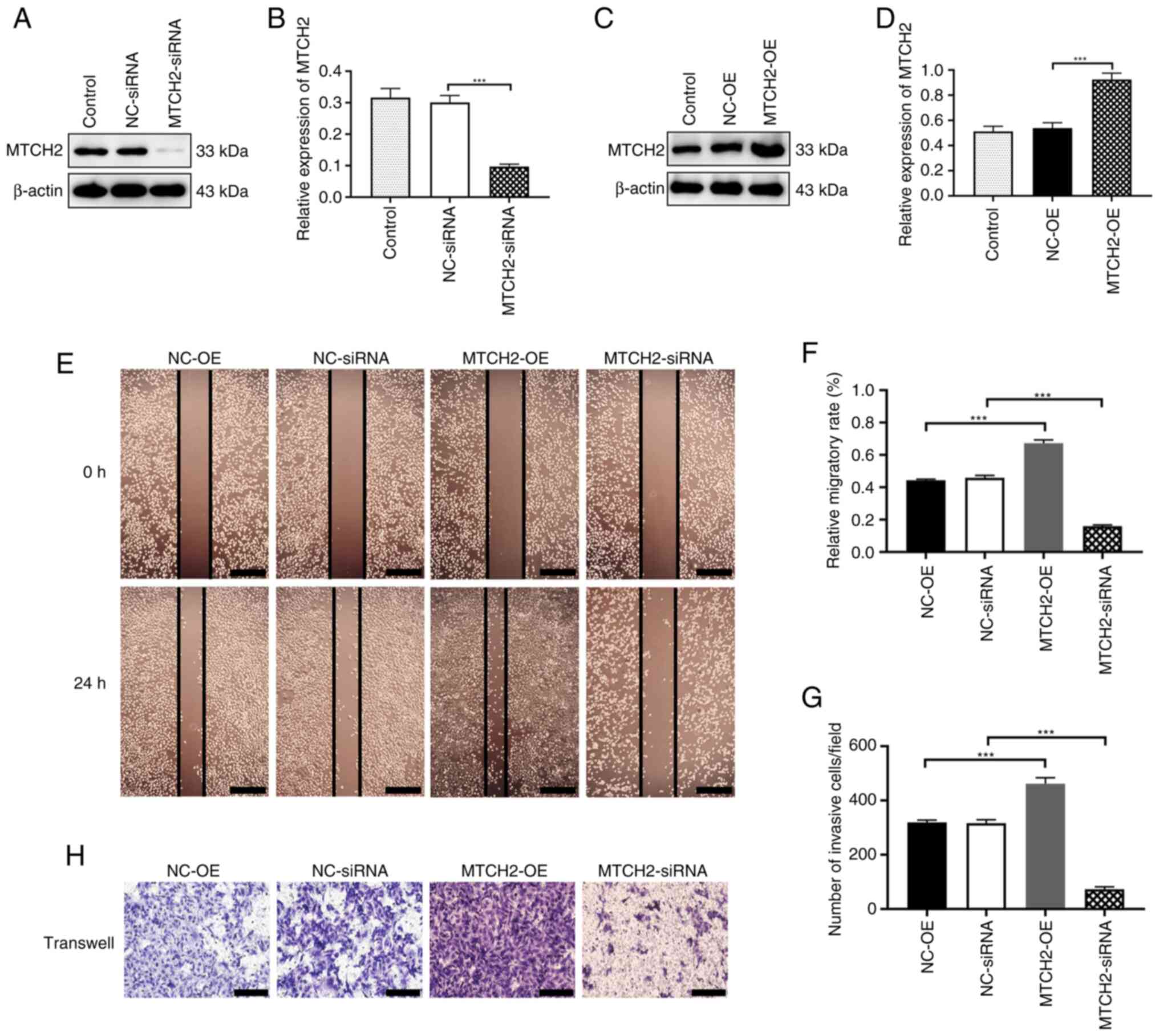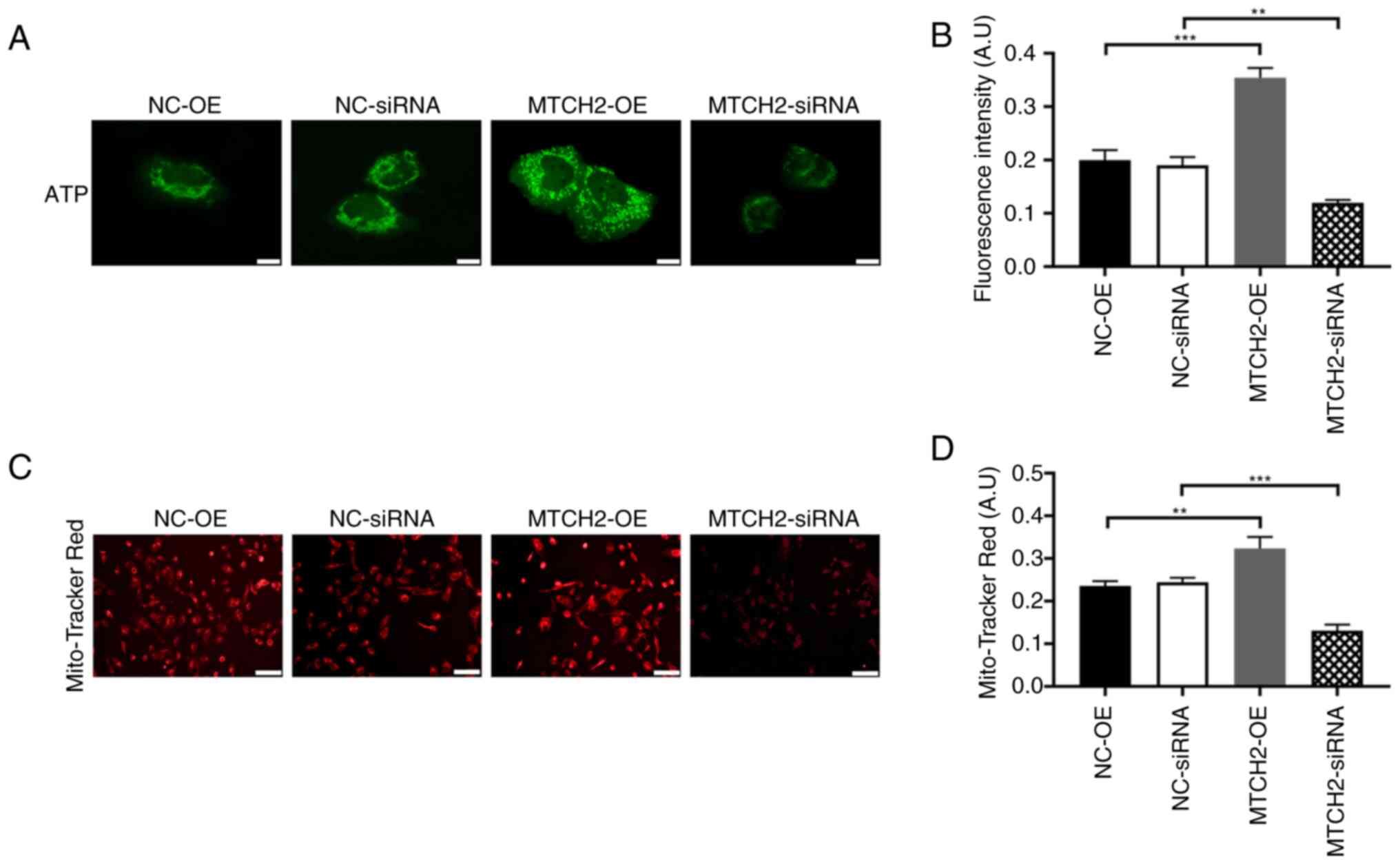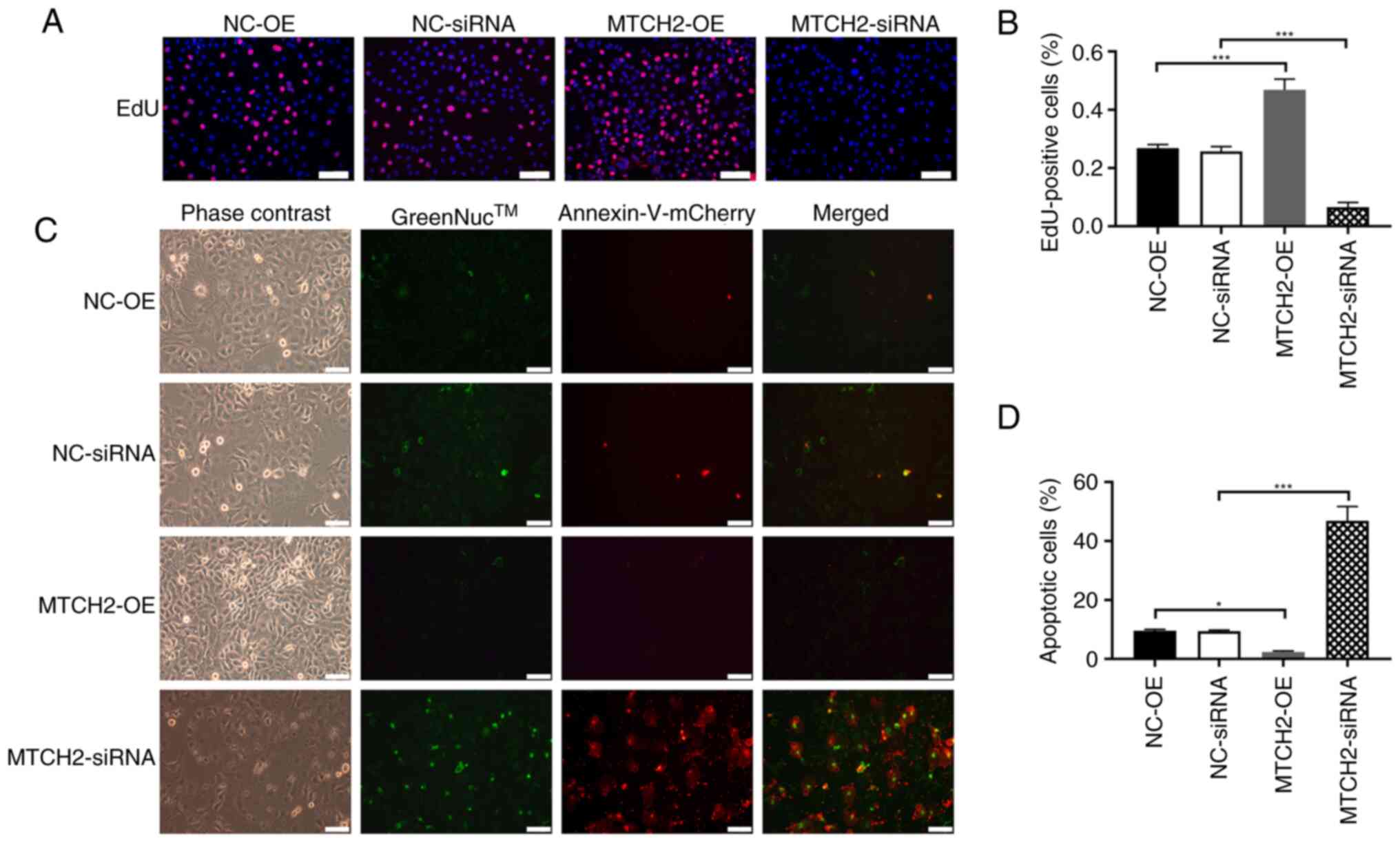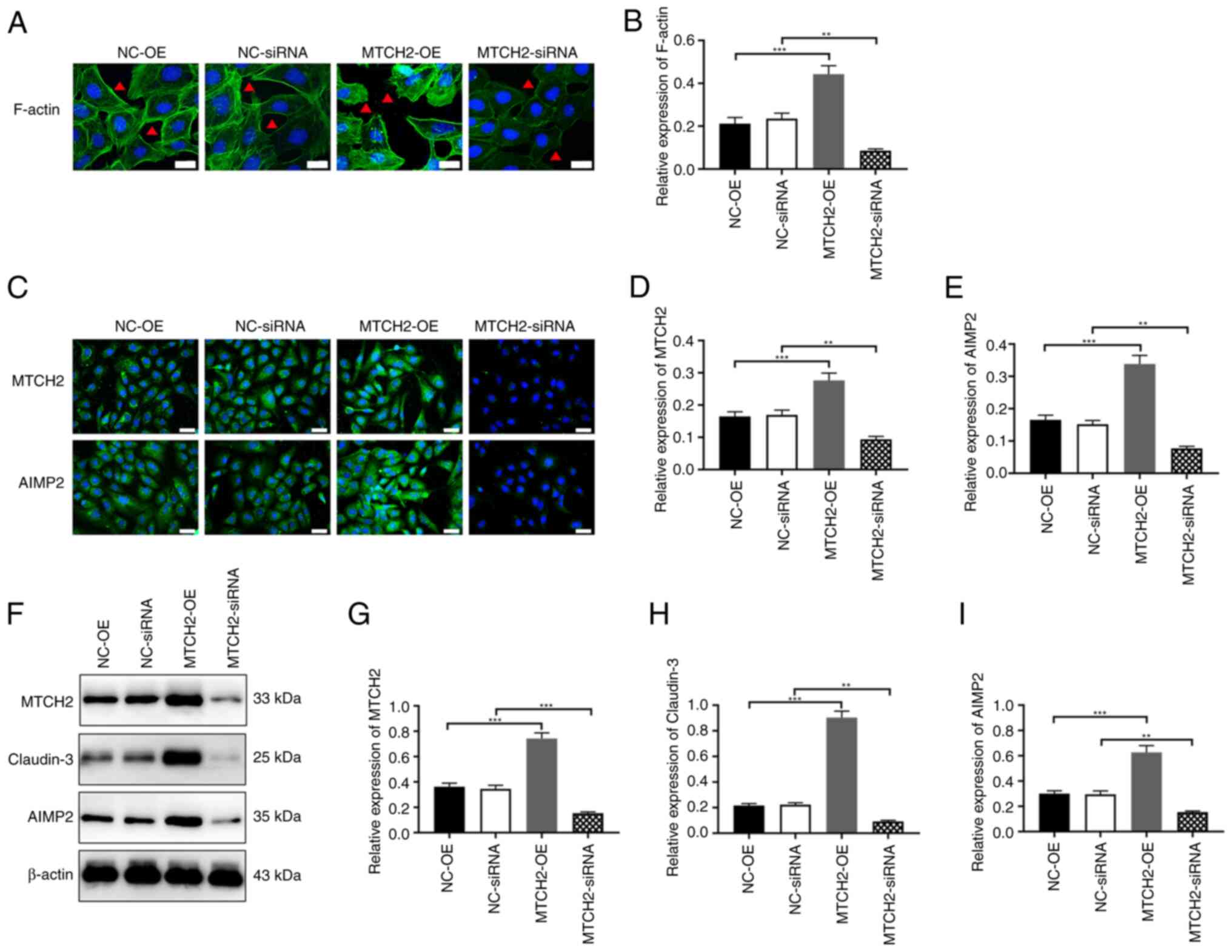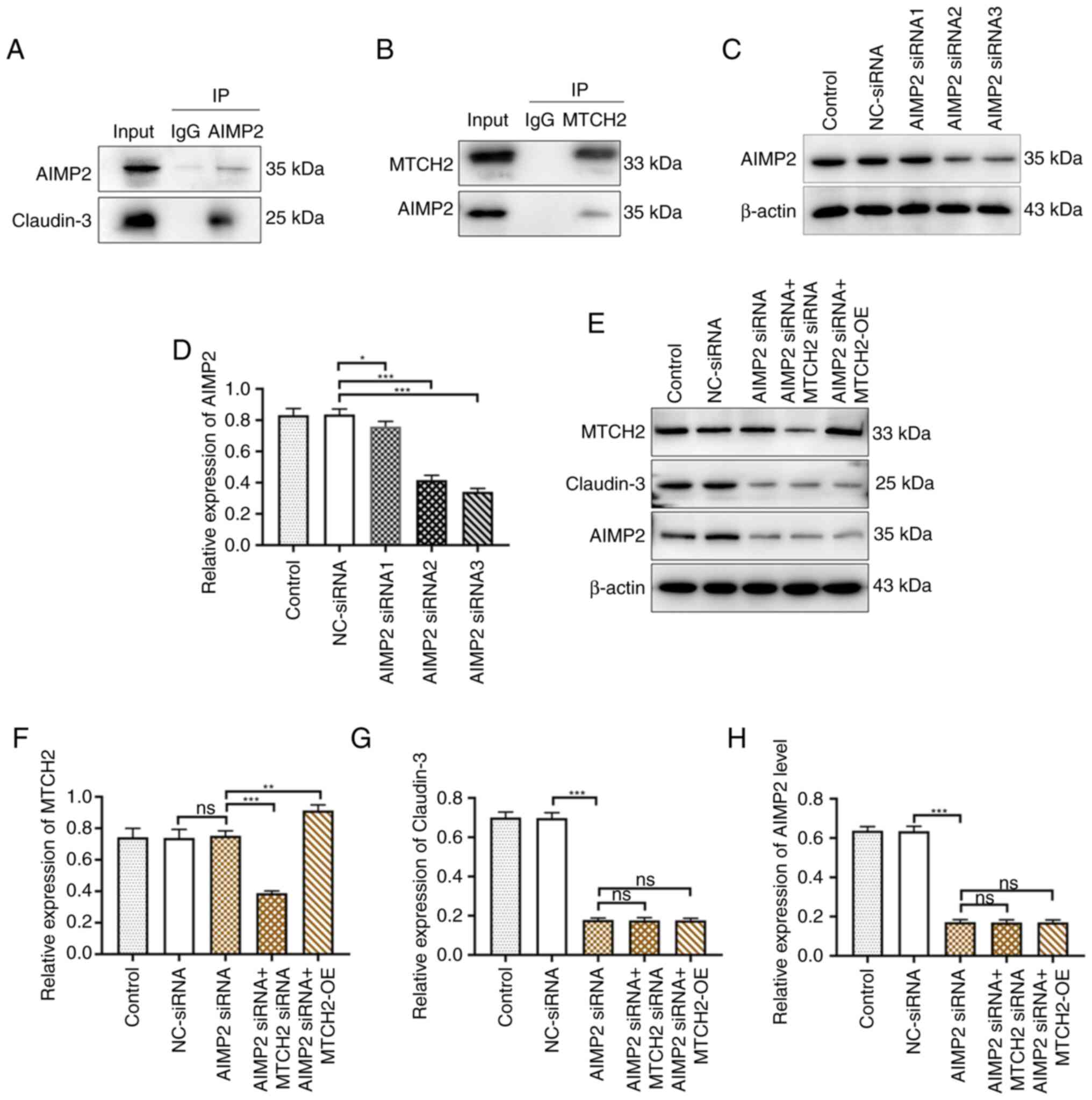|
1
|
Siegel RL, Giaquinto AN and Jemal A:
Cancer statistics. CA Cancer J Clin. 74:12–49. 2024. View Article : Google Scholar : PubMed/NCBI
|
|
2
|
Xiao Y, Bi M, Guo H and Li M: Multi-omics
approaches for biomarker discovery in early ovarian cancer
diagnosis. EBioMedicine. 79:1040012022. View Article : Google Scholar : PubMed/NCBI
|
|
3
|
Yang C, Xia BR, Zhang ZC, Zhang YJ, Lou G
and Jin WL: Immunotherapy for ovarian cancer: Adjuvant,
combination, and neoadjuvant. Front Immunol. 11:5778692020.
View Article : Google Scholar : PubMed/NCBI
|
|
4
|
Tsibulak I, Zeimet AG and Marth C: Hopes
and failures in front-line ovarian cancer therapy. Crit Rev Oncol
Hematol. 143:14–19. 2019. View Article : Google Scholar : PubMed/NCBI
|
|
5
|
Spinelli JB and Haigis MC: The
multifaceted contributions of mitochondria to cellular metabolism.
Nat Cell Biol. 20:745–754. 2018. View Article : Google Scholar : PubMed/NCBI
|
|
6
|
Guna A, Stevens TA, Inglis AJ, Replogle
JM, Esantsi TK, Muthukumar G, Shaffer KCL, Wang ML, Pogson AN,
Jones JJ, et al: MTCH2 is a mitochondrial outer membrane protein
insertase. Science. 378:317–322. 2022. View Article : Google Scholar : PubMed/NCBI
|
|
7
|
Goldman A, Mullokandov M, Zaltsman Y,
Regev L, Levin-Zaidman S and Gross A: MTCH2 cooperates with MFN2
and lysophosphatidic acid synthesis to sustain mitochondrial
fusion. EMBO Rep. 25:45–67. 2023. View Article : Google Scholar : PubMed/NCBI
|
|
8
|
Rottiers V, Francisco A, Platov M,
Zaltsman Y, Ruggiero A, Lee SS, Gross A and Libert S: MTCH2 is a
conserved regulator of lipid homeostasis. Obesity (Silver Spring).
25:616–625. 2017. View Article : Google Scholar : PubMed/NCBI
|
|
9
|
Robinson AJ, Kunji ER and Gross A:
Mitochondrial carrier homolog 2 (MTCH2): The recruitment and
evolution of a mitochondrial carrier protein to a critical player
in apoptosis. Exp Cell Res. 318:1316–1323. 2012. View Article : Google Scholar : PubMed/NCBI
|
|
10
|
Manjunath LE, Singh A, Sahoo S, Mishra A,
Padmarajan J, Basavaraju CG and Eswarappa SM: Stop codon
read-through of mammalian MTCH2 leading to an unstable isoform
regulates mitochondrial membrane potential. J Biol Chem.
295:17009–17026. 2020. View Article : Google Scholar : PubMed/NCBI
|
|
11
|
Kisaki CY, Arcos SSS, Montoni F, Da Silva
Santos W, Calacina HM, Lima IF, Cajado-Carvalho D, Ferro ES,
Nishiyama-Jr MY and Iwai LK: Bothrops jararaca snake venom
modulates key cancer-related proteins in breast tumor cell lines.
Toxins (Basel). 13:5192021. View Article : Google Scholar : PubMed/NCBI
|
|
12
|
Yuan Q, Yang W, Zhang S, Li T, Zuo M, Zhou
X, Li J, Li M, Xia X, Chen M and Liu Y: Inhibition of mitochondrial
carrier homolog 2 (MTCH2) suppresses tumor invasion and enhances
sensitivity to temozolomide in malignant glioma. Mol Med. 27:72021.
View Article : Google Scholar : PubMed/NCBI
|
|
13
|
JanssenDuijghuijsen LM, Grefte S, de Boer
VCJ, Zeper L, van Dartel DAM, van Der Stelt I,
Bekkenkamp-Grovenstein M, van Norren K, Wichers HJ and Keijer J:
Mitochondrial ATP depletion disrupts Caco-2 monolayer integrity and
internalizes claudin 7. Front Physiol. 8:7942017. View Article : Google Scholar : PubMed/NCBI
|
|
14
|
Hana C, Dar NN, Venegas MG and Vulfovich
M: Claudins in cancer: A current and future therapeutic target. Int
J Mol Sci. 25:46342024. View Article : Google Scholar : PubMed/NCBI
|
|
15
|
Zihni C, Mills C, Matter K and Balda MS:
Tight junctions: From simple barriers to multifunctional molecular
gates. Nat Rev Mol Cell Biol. 17:564–580. 2016. View Article : Google Scholar : PubMed/NCBI
|
|
16
|
Lin X, Shang X, Manorek G and Howell SB:
Regulation of the epithelial-mesenchymal transition by claudin-3
and claudin-4. PLoS One. 8:e674962013. View Article : Google Scholar : PubMed/NCBI
|
|
17
|
Jung H, Jun KH, Jung JH, Chin HM and Park
WB: The expression of claudin-1, claudin-2, claudin-3, and
claudin-4 in gastric cancer tissue. J Surg Res. 167:e185–e191.
2011. View Article : Google Scholar : PubMed/NCBI
|
|
18
|
Li JY, Xie F, Xu XP, Ma JJ, Zhou DC, Liao
Y, Tang J, Xie Q, Bai L and Nan QZ: Claudin-3 expression in
colorectal carcinoma and its significance. Nan Fang Yi Ke Da Xue
Xue Bao. 37:63–67. 2017.(In Chinese). PubMed/NCBI
|
|
19
|
Senga K, Mostov KE, Mitaka T, Miyajima A
and Tanimizu N: Grainyhead-like 2 regulates epithelial
morphogenesis by establishing functional tight junctions through
the organization of a molecular network among claudin3, claudin4,
and Rab25. Mol Biol Cell. 23:2845–2855. 2012. View Article : Google Scholar : PubMed/NCBI
|
|
20
|
Yang L and Zhang W, Li M, Dam J, Huang K,
Wang Y, Qiu Z, Sun T, Chen P, Zhang Z and Zhang W: Evaluation of
the prognostic relevance of differential claudin gene expression
highlights claudin-4 as being suppressed by TGFβ1 inhibitor in
colorectal cancer. Front Genet. 13:7830162022. View Article : Google Scholar : PubMed/NCBI
|
|
21
|
Wang H and Yang X: The expression patterns
of tight junction protein claudin-1, −3, and −4 in human gastric
neoplasms and adjacent non-neoplastic tissues. Int J Clin Exp
Pathol. 8:881–887. 2015.PubMed/NCBI
|
|
22
|
Oh S, Yang H, Oh HR, Seo MR, Lee CH, Kim
YH, Choi JY, Kim NY, Cheon GJ, Kang KW, et al: Visualization of a
novel human monoclonal antibody against Claudin-3 for targeting
ovarian cancer. Nucl Med Biol. 114–115. 135–142. 2022.
|
|
23
|
Yu YC, Han JM and Kim S: Aminoacyl-tRNA
synthetases and amino acid signaling. Biochim Biophys Acta Mol Cell
Res. 1868:1188892021. View Article : Google Scholar : PubMed/NCBI
|
|
24
|
Hyeon DY, Kim JH, Ahn TJ, Cho Y, Hwang D
and Kim S: Evolution of the multi-tRNA synthetase complex and its
role in cancer. J Biol Chem. 294:5340–5351. 2019. View Article : Google Scholar : PubMed/NCBI
|
|
25
|
Zhou Z, Sun B, Huang S, Yu D and Zhang X:
Roles of aminoacyl-tRNA synthetase-interacting multi-functional
proteins in physiology and cancer. Cell Death Dis. 11:5792020.
View Article : Google Scholar : PubMed/NCBI
|
|
26
|
Mazaheri M, Yavari M, Marzouni HZ, Stufano
A, Lovreglio P, S'amore S and Jahantigh HR: Case report: Mutation
in AIMP2/P38, the scaffold for the multi-trna synthetase complex,
and association with progressive neurodevelopmental disorders.
Front Genet. 13:8169872022. View Article : Google Scholar : PubMed/NCBI
|
|
27
|
Xu D, Shao F, Bian X, Meng Y, Liang T and
Lu Z: The evolving landscape of noncanonical functions of metabolic
enzymes in cancer and other pathologies. Cell Metab. 33:33–50.
2021. View Article : Google Scholar : PubMed/NCBI
|
|
28
|
Zheng Y, Zhan Y, Zhang Y, Zhang Y, Liu Y,
Xie Y, Sun Y, Qian J, Ding Y, Ding Y and Fang Y: Hexokinase 2
confers radio-resistance in hepatocellular carcinoma by promoting
autophagy-dependent degradation of AIMP2. Cell Death Dis.
14:4882023. View Article : Google Scholar : PubMed/NCBI
|
|
29
|
Li W, Wang T, Fu G, Xu Y, Zhang N, Han L
and Yang M: The allelic regulation of tumor suppressor ADARB2 in
papillary thyroid carcinoma. Endocr Relat Cancer. 30:e2201892023.
View Article : Google Scholar : PubMed/NCBI
|
|
30
|
Yum MK, Kang JS, Lee AE, Jo YW, Seo JY,
Kim HA, Kim YY, Seong J, Lee EB, Kim JH, et al: AIMP2 controls
intestinal stem cell compartments and tumorigenesis by modulating
Wnt/β-catenin signaling. Cancer Res. 76:4559–4568. 2016. View Article : Google Scholar : PubMed/NCBI
|
|
31
|
Miao J, Liu J, Niu J, Zhang Y, Shen W, Luo
C, Liu Y, Li C, Li H, Yang P, et al: Wnt/β-catenin/RAS signaling
mediates age-related renal fibrosis and is associated with
mitochondrial dysfunction. Aging Cell. 18:e130042019. View Article : Google Scholar : PubMed/NCBI
|
|
32
|
Dias MC, Coisne C, Lazarevic I, Baden P,
Hata M, Iwamoto N, Francisco DMF, Vanlandewijck M, He L, Baier FA,
et al: Claudin-3-deficient C57BL/6J mice display intact brain
barriers. Sci Rep. 9:2032019. View Article : Google Scholar
|
|
33
|
Gao J, Aksoy BA, Dogrusoz U, Dresdner G,
Gross B, Sumer SO, Sun Y, Jacobsen A, Sinha R, Larsson E, et al:
Integrative analysis of complex cancer genomics and clinical
profiles using the cBioPortal. Sci Signal. 6:pl12013. View Article : Google Scholar : PubMed/NCBI
|
|
34
|
Liao L, Liu M, Gao Y, Wei X, Yin Y, Gao L
and Zhou R: The long noncoding RNA TARID regulates the
CXCL3/ERK/MAPK pathway in trophoblasts and is associated with
preeclampsia. Reprod Biol Endocrinol. 20:1592022. View Article : Google Scholar : PubMed/NCBI
|
|
35
|
Li W, Lin J, Huang J, Chen Z, Sheng Q,
Yang F, Yang X and Cui X: MicroRNA-409-5p inhibits cell
proliferation, and induces G(2)/M phase arrest and apoptosis by
targeting DLGAP5 in ovarian cancer cells. Oncol Lett. 24:2612022.
View Article : Google Scholar : PubMed/NCBI
|
|
36
|
Wang X, Song X, Cheng G, Zhang J, Dong L,
Bai J, Luo D, Xiong Y, Li S, Liu F, et al: The regulatory mechanism
and biological significance of mitochondrial calcium uniporter in
the migration, invasion, angiogenesis and growth of gastric cancer.
Onco Targets Ther. 13:11781–11794. 2020. View Article : Google Scholar : PubMed/NCBI
|
|
37
|
Berek JS, Renz M, Kehoe S, Kumar L and
Friedlander M: Cancer of the ovary, fallopian tube, and peritoneum:
2021 update. Int J Gynaecol Obstet. 155 (Suppl 1):S61–S85. 2021.
View Article : Google Scholar
|
|
38
|
Lee C, Park SH and Yoon SK: Genetic
mutations affecting mitochondrial function in cancer drug
resistance. Genes Genomics. 45:261–270. 2023. View Article : Google Scholar : PubMed/NCBI
|
|
39
|
Colpman P, Dasgupta A and Archer SL: The
role of mitochondrial dynamics and mitotic fission in regulating
the cell cycle in cancer and pulmonary arterial hypertension:
Implications for dynamin-related protein 1 and Mitofusin2 in
hyperproliferative diseases. Cells. 12:18972023. View Article : Google Scholar : PubMed/NCBI
|
|
40
|
Marciniak SJ, Chambers JE and Ron D:
Pharmacological targeting of endoplasmic reticulum stress in
disease. Nat Rev Drug Discov. 21:115–140. 2022. View Article : Google Scholar : PubMed/NCBI
|
|
41
|
Zejc T, Piontek J, Schulzke JD, Fromm M,
Ervens J and Rosenthal R: Clinical significance of claudin
expression in oral squamous cell carcinoma. Int J Mol Sci.
23:112342022. View Article : Google Scholar : PubMed/NCBI
|
|
42
|
Khan DH, Mullokandov M, Wu Y, Voisin V,
Gronda M, Hurren R, Wang X, Maclean N, Jeyaraju DV, Jitkova Y, et
al: Mitochondrial carrier homolog 2 is necessary for AML survival.
Blood. 136:81–92. 2020. View Article : Google Scholar : PubMed/NCBI
|
|
43
|
Cogliati S and Scorrano L: A BID on
mitochondria with MTCH2. Cell Res. 20:863–865. 2010. View Article : Google Scholar : PubMed/NCBI
|
|
44
|
Zaltsman Y, Shachnai L, Yivgi-Ohana N,
Schwarz M, Maryanovich M, Houtkooper RH, Vaz FM, De Leonardis F,
Fiermonte G, Palmieri F, et al: MTCH2/MIMP is a major facilitator
of tBID recruitment to mitochondria. Nat Cell Biol. 12:553–562.
2010. View Article : Google Scholar : PubMed/NCBI
|
|
45
|
Zhou G, Liu J, Li X, Sang Y, Zhang Y, Gao
L, Wang J, Yu Y, Ge W, Sun Z and Zhou X: Silica nanoparticles
inducing the apoptosis via microRNA-450b-3p targeting MTCH2 in mice
and spermatocyte cell. Environ Pollut. 277:1167712021. View Article : Google Scholar : PubMed/NCBI
|
|
46
|
Ruggiero A, Aloni E, Korkotian E, Zaltsman
Y, Oni-Biton E, Kuperman Y, Tsoory M, Shachnai L, Levin-Zaidman S,
Brenner O, et al: Loss of forebrain MTCH2 decreases mitochondria
motility and calcium handling and impairs hippocampal-dependent
cognitive functions. Sci Rep. 7:444012017. View Article : Google Scholar : PubMed/NCBI
|
|
47
|
Buzaglo-Azriel L, Kuperman Y, Tsoory M,
Zaltsman Y, Shachnai L, Zaidman SL, Bassat E, Michailovici I,
Sarver A, Tzahor E, et al: Loss of muscle MTCH2 increases
whole-body energy utilization and protects from diet-induced
obesity. Cell Rep. 14:1602–1610. 2016. View Article : Google Scholar : PubMed/NCBI
|
|
48
|
Maryanovich M, Zaltsman Y, Ruggiero A,
Goldman A, Shachnai L, Zaidman SL, Porat Z, Golan K, Lapidot T and
Gross A: An MTCH2 pathway repressing mitochondria metabolism
regulates haematopoietic stem cell fate. Nat Commun. 6:79012015.
View Article : Google Scholar : PubMed/NCBI
|
|
49
|
Bahat A, Goldman A, Zaltsman Y, Khan DH,
Halperin C, Amzallag E, Krupalnik V, Mullokandov M, Silberman A,
Erez A, et al: MTCH2-mediated mitochondrial fusion drives exit from
naïve pluripotency in embryonic stem cells. Nat Commun. 9:51322018.
View Article : Google Scholar : PubMed/NCBI
|
|
50
|
Zhao Y, Zhou L, Li H, Sun T, Wen X, Li X,
Meng Y, Li Y, Liu M, Liu S, et al: Nuclear-encoded lncRNA MALAT1
epigenetically controls metabolic reprogramming in HCC cells
through the mitophagy pathway. Mol Ther Nucleic Acids. 23:264–276.
2021. View Article : Google Scholar : PubMed/NCBI
|
|
51
|
Yang C and Svitkina TM: Ultrastructure and
dynamics of the actin-myosin II cytoskeleton during mitochondrial
fission. Nat Cell Biol. 21:603–613. 2019. View Article : Google Scholar : PubMed/NCBI
|
|
52
|
Nakamura S, Irie K, Tanaka H, Nishikawa K,
Suzuki H, Saitoh Y, Tamura A, Tsukita S and Fujiyoshi Y:
Morphologic determinant of tight junctions revealed by claudin-3
structures. Nat Commun. 10:8162019. View Article : Google Scholar : PubMed/NCBI
|
|
53
|
Kim WS, Kim H, Joo MK, Choi BI, Yoo AY,
Park JJ, Lee BJ, Kim SH and Chun HJ: High expression of claudin-4
is associated with synchronous tumors in patients with early
gastric cancer. J Clin Med. 11:35502022. View Article : Google Scholar : PubMed/NCBI
|
|
54
|
De Souza WF, Fortunato-Miranda N, Robbs
BK, De Araujo WM, De-Freitas-Junior JC, Bastos LG, Viola JP and
Morgado-Díaz JA: Claudin-3 overexpression increases the malignant
potential of colorectal cancer cells: Roles of ERK1/2 and PI3K-Akt
as modulators of EGFR signaling. PloS One. 8:e749942013. View Article : Google Scholar : PubMed/NCBI
|
|
55
|
Hashimoto I and Oshima T: Claudins and
gastric cancer: An overview. Cancers (Basel). 14:2902022.
View Article : Google Scholar : PubMed/NCBI
|
|
56
|
Huang YH, Bao Y, Peng W, Goldberg M, Love
K, Bumcrot DA, Cole G, Langer R, Anderson DG and Sawicki JA:
Claudin-3 gene silencing with siRNA suppresses ovarian tumor growth
and metastasis. Proc Natl Acad Sci USA. 106:3426–3430. 2009.
View Article : Google Scholar : PubMed/NCBI
|
|
57
|
He ZY, Wei XW, Luo M, Luo ST, Yang Y, Yu
YY, Chen Y, Ma CC, Liang X, Guo FC, et al: Folate-linked lipoplexes
for short hairpin RNA targeting claudin-3 delivery in ovarian
cancer xenografts. J Control Release. 172:679–689. 2013. View Article : Google Scholar : PubMed/NCBI
|
|
58
|
Choi YL, Kim J, Kwon MJ, Choi JS, Kim TJ,
Bae DS, Koh SS, In YH, Park YW, Kim SH, et al: Expression profile
of tight junction protein claudin 3 and claudin 4 in ovarian serous
adenocarcinoma with prognostic correlation. Histol Histopathol.
22:1185–1195. 2007.PubMed/NCBI
|
|
59
|
Lei N, Cheng Y, Wan J, Blasig R, Li A, Bai
Y, Haseloff RF, Blasig IE, Zhu L and Qin Z: Claudin-3 inhibits
tumor-induced lymphangiogenesis via regulating the PI3K signaling
pathway in lymphatic endothelial cells. Sci Rep. 12:174402022.
View Article : Google Scholar : PubMed/NCBI
|
|
60
|
Qiu J, Zhou T, Wang D, Hong W, Qian D,
Meng X and Liu X: Pan-cancer analysis identifies AIMP2 as a
potential biomarker for breast cancer. Curr Genomics. 24:307–329.
2023. View Article : Google Scholar : PubMed/NCBI
|
|
61
|
Ku J, Kim R, Kim D, Kim D, Song S, Lee K,
Lee N, Kim M, Yoon SS, Kwon NH, et al: Single-cell analysis of
AIMP2 splice variants informs on drug sensitivity and prognosis in
hematologic cancer. Commun Biol. 3:6302020. View Article : Google Scholar : PubMed/NCBI
|















